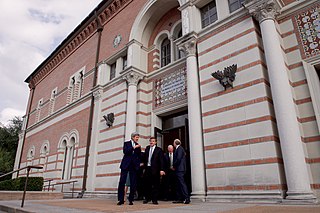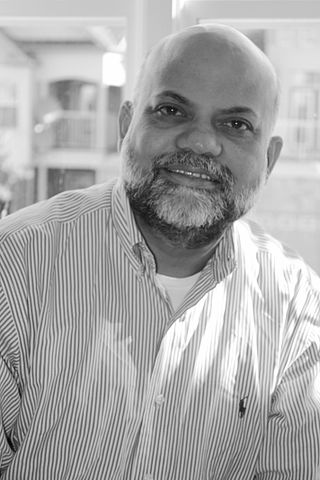
The World Economic Forum (WEF) is an international non-governmental and lobbying organisation for multinational companies based in Cologny, Canton of Geneva, Switzerland. It was founded on 24 January 1971 by German engineer Klaus Schwab. The foundation, which is mostly funded by its 1,000 member companies – typically global enterprises with more than US$5 billion in turnover – as well as public subsidies, views its own mission as "improving the state of the world by engaging business, political, academic, and other leaders of society to shape global, regional, and industry agendas".
The Schwab Foundation for Social Entrepreneurship is a Swiss not-for-profit organization founded in 1998 that provides platforms at the country, regional and global levels to promote social entrepreneurship. The foundation is under the legal supervision of the Swiss Federal Government. Its headquarters are in Geneva, Switzerland. Each year, it selects 20–25 social entrepreneurs through a global "Social Entrepreneur of the Year" competition.

Rice University's Baker Institute for Public Policy, also known as the Baker Institute, is an American think tank on the campus of Rice University in Houston, Texas. Founded in 1993, it functions as a center for public policy research. It is named for James A. Baker, III, former United States Secretary of State, Secretary of the Treasury, and White House Chief of Staff. It is directed by Ambassador David M. Satterfield and funded mainly by donor contributions, endowments, and research grants.
A social enterprise is an organization that applies commercial strategies to maximize improvements in financial, social and environmental well-being. This may include maximizing social impact alongside profits for co-owners.

Social entrepreneurship is an approach by individuals, groups, start-up companies or entrepreneurs, in which they develop, fund and implement solutions to social, cultural, or environmental issues. This concept may be applied to a wide range of organizations, which vary in size, aims, and beliefs. For-profit entrepreneurs typically measure performance using business metrics like profit, revenues and increases in stock prices. Social entrepreneurs, however, are either non-profits, or they blend for-profit goals with generating a positive "return to society". Therefore, they use different metrics. Social entrepreneurship typically attempts to further broad social, cultural and environmental goals often associated with the voluntary sector in areas such as poverty alleviation, health care and community development.

The Internet Governance Forum (IGF) is a multistakeholder governance group for policy dialogue on issues of Internet governance. It brings together all stakeholders in the Internet governance debate, whether they represent governments, the private sector or civil society, including the technical and academic community, on an equal basis and through an open and inclusive process. The establishment of the IGF was formally announced by the United Nations Secretary-General in July 2006. It was first convened in October–November 2006 and has held an annual meeting since then.
Social innovations are new social practices that aim to meet social needs in a better way than the existing solutions, resulting from - for example - working conditions, education, community development or health. These ideas are created with the goal of extending and strengthening civil society. Social innovation includes the social processes of innovation, such as open source methods and techniques and also the innovations which have a social purpose—like activism, virtual volunteering, microcredit, or distance learning. There are many definitions of social innovation, however, they usually include the broad criteria about social objectives, social interaction between actors or actor diversity, social outputs, and innovativeness. Different definitions include different combinations and different number of these criteria. Transformative social innovation not only introduces new approaches to seemingly intractable problems, but is successful in changing the social institutions that created the problem in the first place.
The Maryland School of Public Policy is one of 14 schools at the University of Maryland, College Park. The school is located inside the Capital Beltway and ranks 16th nationally for schools of public policy according to U.S. News & World Report (2012).

Iqbal Z. Quadir is an entrepreneur and promoter of the role of entrepreneurship and innovations in creating prosperity in low-income countries. He has taught at Harvard Kennedy School and at Massachusetts Institute of Technology. He is the brother of Kamal Quadir.

Linda Rottenberg is an American businesswoman and author. She is the author of Crazy Is a Compliment: The Power of Zigging When Everyone Else Zags. She is the CEO and Co-founder of Endeavor, a non-profit organization that encourages the power of entrepreneurship.

Ngaire Tui Woods CBE is the founding dean of the Blavatnik School of Government and professor of Global Economic Governance at the University of Oxford. She founded the Global Economic Governance Programme and is the co-founder of the Oxford–Princeton Global Leaders Fellowship programme. She was born in New Zealand.
The Financial Stability Board (FSB) is an international body that monitors and makes recommendations about the global financial system. It was established after the G20 London summit in April 2009 as a successor to the Financial Stability Forum (FSF). The Board includes all G20 major economies, FSF members, and the European Commission. Hosted and funded by the Bank for International Settlements, the board is based in Basel, Switzerland, and is established as a not-for-profit association under Swiss law.

Kamal S. Quadir is a Bangladeshi American entrepreneur and artist best known for introducing e-commerce in Bangladesh by founding CellBazaar, an electronic marketplace which, after reaching 4 million users, was acquired by Norwegian telecommunications operator Telenor in 2010. CellBazaar later was rebranded as ekhanei.com. He is the brother of Iqbal Quadir.

The Afghanistan Public Policy Research OrganizationArchived 2008-12-11 at the Wayback Machine(APPRO) is an independent social research organization promoting social and policy learning to benefit development and reconstruction efforts in Afghanistan. APPRO is registered with the Ministry of Economy of Afghanistan as a not-for-profit organization and headquartered in Kabul, Afghanistan.
Landesa Rural Development Institute is a nonprofit organization that works with governments and local organizations to obtain legal land rights for poor families. Since 1967, Landesa has helped more than 180 million poor families in 50 countries gain legal control over their land.
Multistakeholder governance is a practice of governance that employs bringing multiple stakeholders together to participate in dialogue, decision making, and implementation of responses to jointly perceived problems. The principle behind such a structure is that if enough input is provided by multiple types of actors involved in a question, the eventual consensual decision gains more legitimacy, and can be more effectively implemented than a traditional state-based response. While the evolution of multistakeholder governance is occurring principally at the international level, public-private partnerships (PPPs) are domestic analogues.

The World Government Summit is an annual event held in Dubai, United Arab Emirates. It brings together leaders in government for a global dialogue about governmental process and policies with a focus on the issues of futurism, technology innovation and other topics. The summit acts as a knowledge exchange hub between government officials, thought leaders, policy makers and private sector leaders and as an analysis platform for the future trends, issues and opportunities facing humanity. The summit hosts over 90 speakers from 150 participating countries, along with over 4000 attendees.
Philip E. Auerswald is an American author, economist, and cofounder and coeditor of Innovations (journal). His most recent book, The Code Economy: A Forty-Thousand-Year History, explains how code has been a key driver of human development.
Social entrepreneurship in South Asia involves business activities that have a social benefit, often for people at the bottom of the pyramid. It is an emerging area of entrepreneurship that is supported by both the public sector and the private sector.
Martin Burt is a Paraguayan social entrepreneur, author, former mayor of Asunción and former chief of staff to Paraguay's president, known for founding Fundación Paraguaya in 1985, a leading non-profit and micro-finance organization in Paraguay, and creator of the Poverty Spotlight, a poverty measurement tool and coaching methodology.










